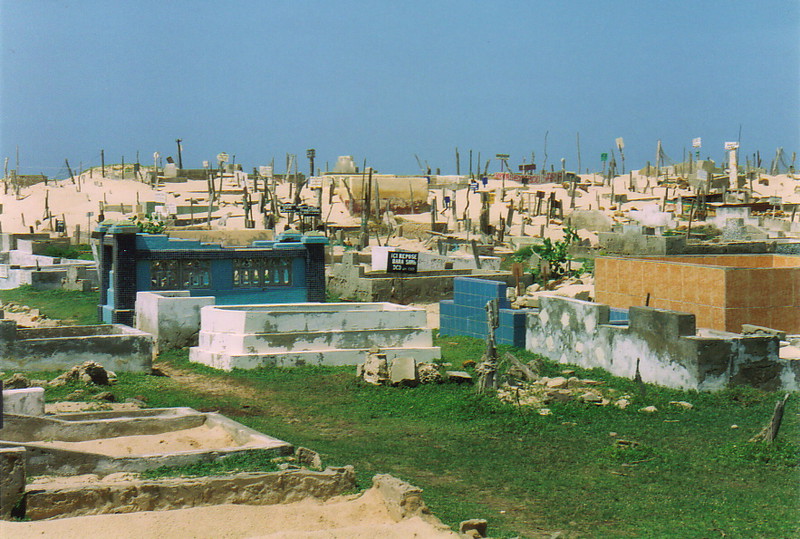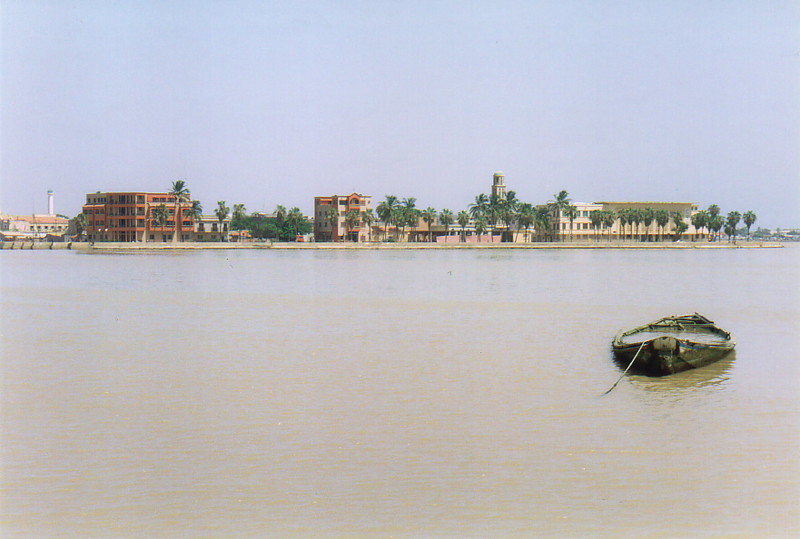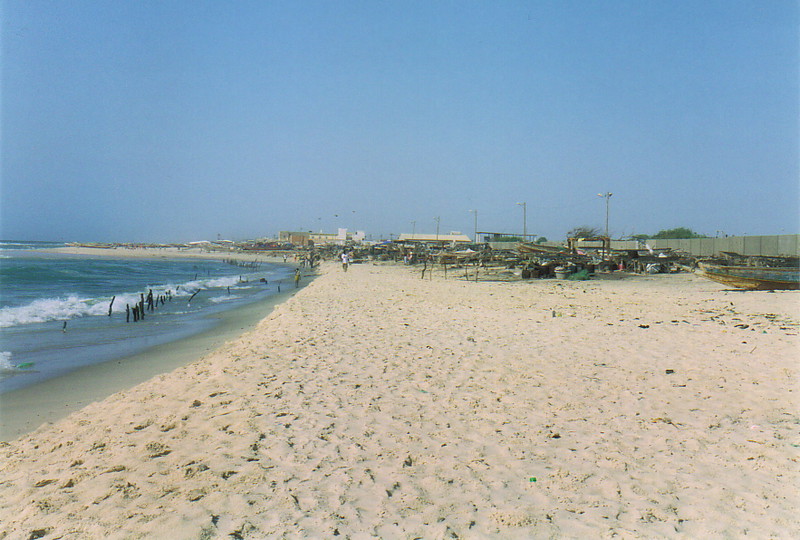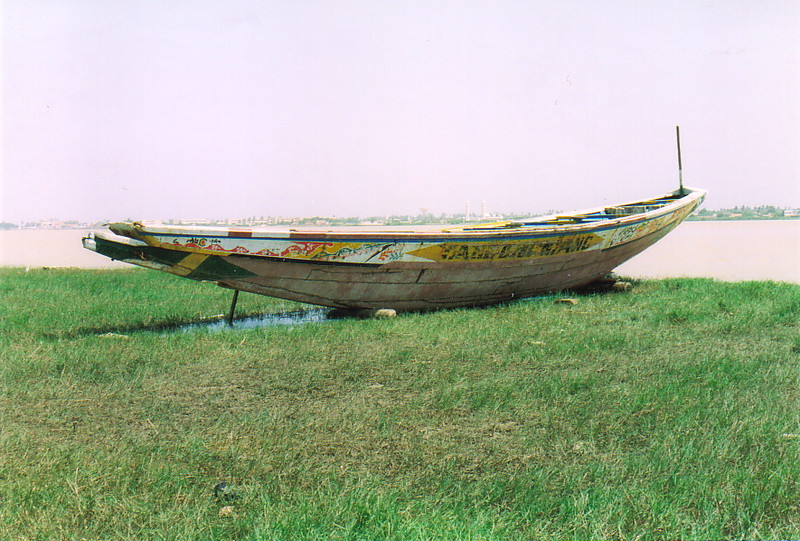
I arrived in St-Louis with an annoying tic in my right eye and the hollow feeling of leaving familiar territory. I was only in Dakar for a few days, but already my mind, preoccupied with feeling homesick and sorry for itself, was desperately trying to put down roots, even somewhere as unpleasantly sweaty as the capital of Senegal. Now I've ditched the daily routine of Yoff and taken a bush taxi to the north of the country, and it feels like leaving home all over again; I guess it will take some time before being alone stops feeling so lonely.
A bush taxi, or taxi brousse in the local patois, is nothing more than an eight-seat Peugeot 504 station wagon in which each of the seven passenger seats is sold for a fixed price. Bush taxis queue up alongside the buses in most Senegalese cities and they leave when full; on a popular route like Dakar to St-Louis it doesn't take long to sell all seven seats, and then it's a direct drive to the destination, a much quicker proposition than the bus, though it costs about 30 to 40 per cent more. In theory the prices are fixed by the government, but in practice the touts charge you extra for any bags you might have, and the Senegalese are as cut-throat in their bargaining as you would expect, especially when it comes to fleecing stupid white men like me. I know I paid far too much for my bag – you can sense it in the way the touts look at you – but getting ripped off is all part of the learning process.
Unfortunately my window seat on the middle row proved to be a nightmare; hot, dry air gushed through the broken window at breakneck speed, constantly battering my face like an industrial-strength hairdryer, and four hours later I had no feeling in the right side of my head, my hair felt as if it was in dreadlocks, and the bottom lid of my right eye started to twitch involuntarily. By the time we arrived I felt as dried and withered as a prune.
The Beach

Thank goodness for St-Louis, then, or more accurately the wonderful strip of beach to the south of the town. This area is called L'Hydrobase because back in the 1930s it was an important refuelling stop for planes flying between Europe and South America; these days it's home to a number of picture-perfect beach hut complexes, each of them overlooking a west-facing Atlantic beach.
I took a taxi to Hôtel l'Oasis on a whim, and I struck gold. For CFA10,000 a night (just under £10) I got my very own beach hut, big enough to house four beds, and I happily collapsed into the hammock the hotel had so thoughtfully provided in the sunset, where I introduced myself to the local sandfly population and tried not to step on the crabs scuttling along the beach. Slapping away, I idly browsed my guidebook, noting that not only was St-Louis the capital of Senegal until Dakar took over in 1958, but it's also a UNESCO World Heritage site, an indication that it's considered to be of global significance. I took this to be a good sign as I tucked into a delicious fish pie in the hotel's restaurant; I couldn't wait to get stuck into St-Louis in the morning.

What a pity that I pretty much missed the point of the place. After waking up among the itchy effects of paradise, I decided to walk into town, some 4km away from my hotel, and I was glad I did, as it enabled me to get a feel for the town's layout. The main centre of St-Louis is built on a lozenge-shaped island in the middle of the River Senegal as it flows from north to south, parallel to the coast (the river finally meets the sea about 20km south of town); bridges link the island to the mainland to the east and to the long, thin peninsula to the west (the one that's home to L'Hydrobase). This set-up is pretty unique and adds a definite charm to the place, and as I approached the island from the south I couldn't wait to get stuck into the promised colonial architecture.
Surprisingly St-Louis turned out to be nothing terribly special. It isn't a dump, but it isn't much cop either. The peninsula to the west of the main island is home to a rancid fishing village of the type you find dotted all over the coasts of the developing world; the town centre might have plenty of balconies but it has nothing on the Mediterranean vibe of Île de Gorée (which is also a World Heritage site); and I walked through the town square, with (according to the book) its 'air of faded elegance', wondering whether I'd got the wrong St-Louis. Even the beach on the way up looked decidedly dodgy; I noted the rusting hulk of a beached fishing trawler on the outskirts of town, and couldn't help wondering whether anyone here even knows who UNESCO is. Somehow I doubt it.
From the Heart

I didn't really mind that St-Louis turned out to be a disappointment because I rather enjoyed wandering through the squalid fishing village, nodding bonjour to the locals and grinning the grin of a man who isn't remotely fluent in the local language. Indeed, people were very friendly, so it was no surprise to be accosted by a happy-looking chap in the centre of town who introduced himself as Falou and latched onto the fact that I was English.
'Not many Anglais visiting here,' he said, his eyes masked by ultra-cool wraparound shades. 'Many Français, many Belgiques, but not many Anglais. Where you from, Marc?'
'London,' I replied.
'Ah, London,' he said. 'You know Liverpool?'
'Sure do,' I said.
'You know Mr Ibra Bah?' he asked, hopefully. 'He lives there, he is a good friend of mine.'

'Um, no sorry, I don't,' I said. 'There are millions of people in Liverpool, you know.'
'Ah yes,' he nodded. 'Anyway, it is good to be meeting an Englishman who does not care about the colour of the skin, I think, and it is good to know you think from the heart and from the head, and that you are welcome to my country.'
'Thank you Falou,' I said. 'It's great to be here, and who cares about the colour of people's skin?'
'We are all the same colour underneath,' he said. 'Please, put out your left hand. Here is a gift, from my heart and my head, not for money.' And into my left hand he put a necklace of a simple design that I'd seen in Dakar, consisting of a shell implanted in a small block, painted in the Rastafarian colours of yellow, red, black and green.
'I can't take this,' I said, automatically assuming it was going to lead to some kind of scam. 'I really can't.'

'This is a present from my peoples to you, welcome in my country,' he said, and when I continued to protest that he was too kind, he started getting annoyed. 'I give you this, I never want money, it is the African way for visitors in my country. I leave you to explore my town, and I give you this present. If you want later I can show you my shop, but I no take money from you.'
With that he clipped the necklace round my neck and wandered back to the square, leaving me feeling a bit guilty. 'Perhaps he's genuine,' I thought. 'Things might be different in Senegal.' And seemingly the recipient of a free necklace, I went off to explore the north end of town.
About an hour later, after an abortive attempt to get connected in the town's less-than-reliable internet café, I bumped into Falou again, and this time he persuaded me to visit his shop. I knew I wasn't going to buy anything, but out of politeness I went along with it and started talking about the internet café and how I'd been trying to contact my girlfriend. And that's when I realised, with some relief, that Falou wasn't the utterly selfless man he claimed to be.

'You are missing your girlfriend,' he said, 'so you take this for her.' He handed me a half-finished ebony carving from his stall, but again I protested and said that I wasn't able to carry too many things around because I already had too much stuff and was planning to travel for a year, but he wouldn't hear of it and again repeated that it was from the heart, and not for money. Again I wondered whether my cynicism was unfair; he was making it crystal clear that he wasn't going to try to take any money off me, and he seemed genuine.
'Tomorrow is my son's naming ceremony,' he continued. 'Perhaps if you have time you can come with me, maybe we drink some African beers, and you take photos, we have a good time.'
'That's a shame,' I said. 'I'm going back to Dakar tomorrow.'
'Oh,' he said, and put on a sad face. 'Well, tomorrow I buy sheep for ceremony, perhaps you like to give me small money for this, from the heart and from the head, for my son? Like I give you present from the heart and from the head to take for your girlfriend.'

Aha, I thought, at last! He'd finally got to the point; of course he was being friendly for business reasons, and of course this was just an attempt to get me to buy something, albeit in a roundabout way. I had to give him credit though; he'd spun a good yarn, but I didn't travel round Asia without learning a thing or two, and I now was on home ground. I relished the thought of running rings round him, now I knew he was just another salesman trying to squeeze money out of dumb tourists like me.
I was kind, though, and only strung him along for ten minutes or so, waxing lyrical about the heart and the head and steadfastly refusing to commit to anything other than handshakes, good wishes and pleasantries. By the time I'd finished he was thoroughly frustrated, so I took off the necklace, handed back the ebony piece, looked him in the eye and said, 'From my heart, and from my head, thank you for the game, but I will not give you any money, you will not give me anything from your stall, and we will both be happy.'
And finally Falou looked at me as one scam merchant to another, smiled, shook my hand, and gave up. It looks like Africa is going to be just like Asia after all, and I relished the thought as I wandered back to my hotel along the fish-strewn beach, past the wreck and into the safety of my beach hut.
After all, it's a fun game when you treat it as such, especially when there's precious little else going on in town. And in a sense the cut and thrust of bartering is the real heritage of the developing world: people have been fleecing and bargaining for millennia, though in the West we've pretty much managed to eradicate it. It's a more interesting piece of world heritage than the architecture of St-Louis, anyway.